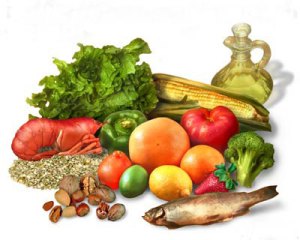Who wouldn't want to live in a place that was recognized worldwide due to the fact that its inhabitants lead a healthy life, with the lowest rates of chronic diseases?
Well, this region is the Mediterranean! Formed by countries from three different continents – Italy, Spain, Greece, Yugoslavia, France and Albania (from Europe), Egypt, Libya, Tunisia, Algeria and Morocco (from Africa), Turkey, Israel, Syria and Lebanon (from Asia) – where everyone is bathed by the same Sea: the Mediterranean.
Despite the countless cultural, economic and social differences between them, certain geographic characteristics (climate, temperature, soil) have influenced their agriculture and, consequently, their eating habits, over the centuries.
The diet of Mediterranean countries consists of a high consumption of fruits, vegetables (greens and legumes), cereals, legumes (chickpeas, lentils), oilseeds (almonds, olives, walnuts), fish, milk and dairy products (yogurt, cheeses), wine and olive oil.
But what makes it different in relation to food in other regions of the world? There is a low consumption of red meat, animal fats, processed products and sweets (rich in fat and sugar).
The following table presents some foods and their benefits:
| Foods | Benefits |
| Fruits and vegetables | Because they contain a large amount of fiber and antioxidants (such as beta-carotene, lycopene, vitamins E and C) they prevent cancer. |
| Cereals | They provide energy for the body. If they are whole, they also contribute B complex vitamins, vitamin E, selenium and fiber. |
| Legumes | Source of fiber and vegetable proteins. Fiber fights constipation, prevents cancer of the colon and rectum (regions of the large intestine) and reduces the level of “bad” cholesterol (LDL), preventing the onset of heart disease. |
| Oilseeds | Because they contain mono and polyunsaturated fatty acids, oilseeds reduce a person's chance of developing hypercholesterolemia (high cholesterol in the blood). However, anyone who follows a food plan with the aim of losing weight should not exceed their consumption, as despite the numerous advantages, they are very high in calories. |
| Fish | Rich in omega-3 fatty acids, acting against the onset of a variety of diseases, including hypertension, atherosclerosis, heart disease and cancer. |
| Yogurts | Source of calcium. Calcium contributes to the prevention of osteoporosis and the lactobacilli present benefit our intestinal microbiota, combating pathogenic microorganisms that may be present in the intestines. |
| Red wine | Due to the high amount of flavonoids (antioxidants), red wine prevents the formation of fatty plaques on the inside of blood vessels (atheromas), and consequently, reduces the risk of developing heart disease. According to Mediterranean culture, red wine should be consumed during meals, as the presence of food alleviates the toxic effects of alcohol on the body. |
| Olive oil | Rich in phenols (antioxidants) and monounsaturated fatty acids, the latter of which increases the level of “good” cholesterol (HDL), benefiting our heart. According to the custom of the Mediterranean people, the ideal is to consume it daily, for example, to season salads. But, we cannot forget that olive oil, like any other fat, is caloric. Therefore, its consumption should not be exaggerated! |
We can observe that the foods that make up the Mediterranean diet are sources of vitamins, minerals, mono and polyunsaturated fatty acids, fiber and antioxidants. Furthermore, they are easily found here, in Brazil. Therefore, if we wish to live a long, healthy life; We must start introducing these foods into our daily meals.
Source: CyberDiet – http://cyberdiet.terra.com.br/alimentacao-mediterranea-a-dieta-da-longevidade-2-1-1-92.html

